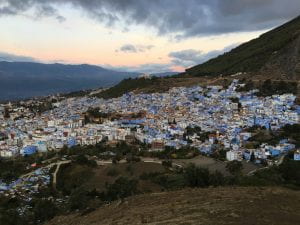Folks, we are back in business. After a 2-week blogging hiatus due to extensive travel and a bit of academic drudgery, I’ve found my way to an excellent local café in order to bash out some recollections about recent experiences. The last couple weeks have been a bit of a blur: first a 5-day trip to Morocco, then just one day back in Granada before heading off with 3 close friends to Paris, where we spent 3 nights. I’m glad to now be back in Granada and to have the chance to reflect a bit on travel experiences that were both impactful and enjoyable.
The trip to Morocco was quite unique. It was both my first time in the continent of Africa and my first time in a Muslim-majority country, and cultural differences between the US and Morocco are certainly significant. We journeyed to 3 very different cities during our time there – Tangiers, Rabat, and Chefchaouen – and were able to have a good number of interactions with locals in addition to hitting various touristy sites.
For me, the most impactful part of our trip to Morocco was a Q&A session we had with 4 female refugees from the Ivory Coast. They told us with brutal honesty and incredible bravery about how they ended up in Morocco, their life circumstances, and dreams for the future. For all of the women, fleeing to Morocco was a last resort. One of them recounted a harrowing tale about escaping from an arranged marriage to a man several decades older than she was. During the marriage, she was physically abused and repeatedly raped; she eventually fled to Morocco with her 2-year-old son.
Another refugee spoke to us about how much she misses her mother (who remains in the Ivory Coast) and how everything she does is for her mom. For this woman, leaving her village and immigrating to Morocco was also an act of utter desperation due to appalling circumstances. In her case, an arranged marriage was also on the horizon. But the more immediate problem was that her uncle, the leader of her highly patriarchal family unit, had decided that this woman needed to undergo the inhumane operation commonly known as a female circumcision. With help from her mother, she was able to leave the country and find her way to Morocco. Although grateful that she was able to escape her village, this woman told us that leaving her mother behind was unbearably painful for her, especially since they now have no means of communicating with one another.
But perhaps the most distressing part of our conversation was the information they relayed to us about systematic efforts by the Moroccan government – in exchange for financial aid from the Spanish government and the EU – to not only discourage immigration to Europe but to essentially make it impossible. They also told us that the Moroccan police readily use force in order to achieve this goal, and significant racism exists between native Moroccans and sub-Saharan immigrants.
By the end of our discussion session, I don’t think there was a dry eye left in the room – mine included. My classmates and I were all feeling a range of similar emotions: intense anger, horror, grief, and shock. It’s also hard not to feel defeated and helpless when confronted with this sort of unimaginably ugly reality. However, it was impossible not to feel some measure of inspiration and hope after the encounter. The refugees’ resiliency in the face of unfathomable difficulties is incredibly inspiring, and their enduring desire to obtain an education and a better life for themselves and their children is enormously laudable.
Alright. My stomach is audibly clamoring for food so I’m going to wrap up my lengthy spiel. I have a fair amount left to say about Morocco – will hopefully get around to doing so in a future post. Adios, and in case I don’t get around to posting before next Thursday, happy Thanksgiving!!
The gorgeous mountain city of Chefchaouen; most of the buildings in its Old City are painted blue.
